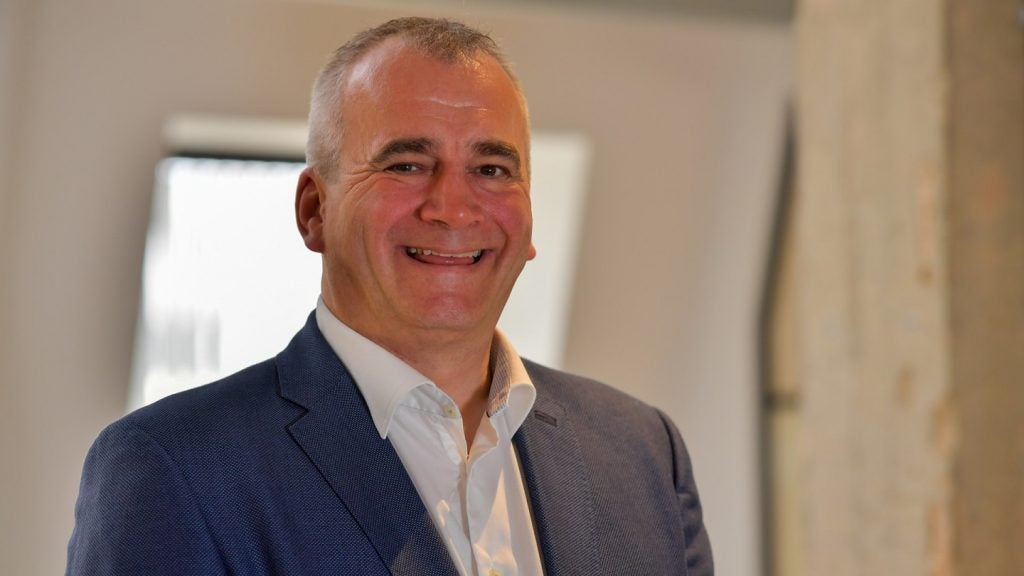
Following the departure of long-standing CEO Adam Tyler, finding a suitable replacement at the NACFB could have been tricky. Motor Finance had the chance to catch up with new interim chief executive Rob Lankey to find out how he intends to make his mark on the association during his stint there
Replacing someone like Adam Tyler at the National Association of Commercial Finance Brokers, who over more than a decade as chief executive officer at the NACFB shaped the organisation into what it is today, could be an intimidating task for someone hired externally.
Yet when Rob Lankey, the interim chief executive officer at the NACFB who replaced Tyler, got a phone call saying: “Adam’s looking to move on, would you be interested in being interim CEO?”, his reaction was to see it as a great opportunity, both for himself and for the association.
Lankey’s career has generally involved growing smaller businesses into something larger. He started off at Norwich and Peterborough Building Society when its commercial business was still in its infancy, with just three or four people on the team.
Starting as a self-described dogsbody, eight years later – and at the age of 28 – he was executive manager of the commercial mortgages team. Over the course of his 17-year career there, that department grew considerably until 2006, when it made up 36% of the building society’s profit.
In 2007 he received a call from a headhunter, offering him the chance to start a brand new commercial mortgage lender from scratch or, as he describes it: “Literally a blank piece of paper – no building, no staff, or anything.”
It was an opportunity he did not turn down, and in August 2007 Base Commercial Mortgages was launched.
Lehman collapse
How well do you really know your competitors?
Access the most comprehensive Company Profiles on the market, powered by GlobalData. Save hours of research. Gain competitive edge.

Thank you!
Your download email will arrive shortly
Not ready to buy yet? Download a free sample
We are confident about the unique quality of our Company Profiles. However, we want you to make the most beneficial decision for your business, so we offer a free sample that you can download by submitting the below form
By GlobalDataWhile Lankey says the business launched well, it was also largely funded by Lehman Brothers. The following year Lehman Brothers went bust, and Lankey admits: “As a consequence of that, a business that was going really well was instead facing down the barrel of collapsing.”
In order to survive, the management team at Base decided to pursue a merger with a small bank, eventually signing an agreement with Ruffler Bank in May 2009. The new entity was eventually renamed Aldermore.
Initially Lankey was responsible for the lending and credit side at Aldermore, before moving to the commercial mortgage and property development side. Then, in 2014, he became group distribution director. After this he became chief data officer, before deciding to leave Aldermore at the end of June 2016.
Reflecting on his time at the bank, he notes: “I was very proud to have not only survived [the recession], but to have also have been part of the start-up team at Aldermore – you don’t often get a chance to start a new bank. That was a great honour and privilege.”
Shortly after leaving Aldermore he received the call from the NACFB, offering him the position of interim CEO, which he accepted.
In Lankey’s own words, he gets a buzz out of transforming businesses – so there is a natural question about why he would agree to become interim CEO of an already-established association. What’s more, given that his history has been more on the lending side, why did he join an association ostensibly for brokers?
“The opportunity to come in here with the mandate to get things done – which is to introduce positive change and build on the fantastic momentum started by my predecessor – this is great for me, as that’s what I do. With the experience I’ve had with growing businesses, the governance around regulation that comes with being in a building society and a bank pre- and post-credit crunch, and working as a non-executive director in the housing association space, has given me expansive experience with which to draw on in an organisation like this,” he says.
In Lankey’s view, the NACFB has a watershed opportunity thanks to the unprecedented changes occurring in the compliance space. In his view, some of these changes are not as widely or as well understood as they need to be in the industry, and that this is also true for brokers.
Raising the game
In 2016, the NACFB released its Minimum Standards Document, which outlined how it expected its brokers to conduct themselves. It also produced a summary of minimum standards to help those without the time or inclination to read through the entirety of the original document.
According to Lankey, there has so far been hit-and-miss, sporadic adoption of the standards, which he says can cause problems for the entire chain.
He believes lenders have a responsibility for their brokers, and if lenders are not careful could end up with unenforceable loans. For brokers, compliance is now an inherent part of their business, with the potential for criminal investigations if things go badly enough wrong.
Lankey sees this as an opportune moment for the NACFB to get on the front foot, and establish its logo as a form of standard, ensuring patrons are more keen to use NACFB members and become patrons, and in turn making NACFB membership more appealing to brokers.
In order to encourage this, the NACFB has begun auditing its members.
Describing the minimum standards, Lankey notes: “The Minimum Standards Document, which has gone out to our members, sets out what the audit process will be like.
“The point to stress here is the word ‘minimum’. We’re not looking for somebody to be of a platinum standard, and certainly people shouldn’t review it that way. This is the minimum thing a member should be able to demonstrate, and it’s all about evidence.”
Documentation is key, and there is an understanding that some commercial brokers have not been used to documenting and evidencing everything that needs to documented and evidenced, especially in a way the regulator would need.
For the audit, the aims of the reviews will be to go through a series of self-audit checks, and to effectively give that broker an independent clean bill of health or a remediation.
Although the organisation has just begun the auditing process, it is already looking at how it can use the data collected to benefit patrons.
Lankey notes: “That’s valuable data. You could track success of remediation activity, so if you imagine a whole panel of brokers graded green, amber and red, that’s not only extremely useful for patrons to know, but it’s also measurable and traceable.
“We might have had X number of ambers and Y number of reds last month; how many is it this time? You can see it ever-improving.
“I don’t think you’ll ever get to a green position across the whole membership because life is not like that. But you go through that initial review of where we stand today, and then you go through a programme of remediation activities to minimise the number of those sitting in the amber and red categories.”
The association is ideally placed for such a role, he says. For lenders, auditing every broker could create an untenable level of work – some lenders have hundreds of brokers, and these brokers will not always have simple broking structures. Checking every single one on a regular basis would create a lot of work.
From the brokers’ point of view, a broker working with dozens of lenders would find it equally burdensome to be audited with rigour from every single lender, each potentially asking a similar set of questions to the last.
Instead, Lankey thinks it will be preferable for the NACFB to step in, and independently grade each of its members, and let its patrons use the information it finds.
“We’ve got a lot of ambition in this area, and we’ve got to be bold enough to put our chest out and take the position of thought leadership in this space,” he adds.
An example of this surrounds getting the correct Financial Conduct Authority (FCA) permissions before conducting consumer credit activity. Although NACFB members tend to deal with commercial finance, vehicle finance brokers especially often have FCA licences and often do some consumer activity.
Lankey notes that those working outside the permissions are committing a criminal activity, would be graded ‘red’ on the NACFB’s audit, and would likely face some form of immediate censure.
He notes: “We’re working with commercially aware people who have probably been doing what they’ve been doing for a while, are fairly bright and aren’t ignorant of these things, especially if they’re members of the NACFB. Is it fair to say someone could do it accidentally? Possibly not.”
He adds that doing so would require a high level of ignorance of the market, the regulation and the minimum standards, and consequently the NACFB would come down quite hard on those it found to be operating in the consumer credit market without the correct permissions.
Ensuring brokers are operating in an efficient, clean manner is more important than just regulation, however. For the past few years, secured credit has been operating in a period of strong growth, with the FLA regularly reporting double-digit growth. Within this, underlying issues might become hidden, only to come to the fore when credit conditions are not quite so good.
Lankey is generally optimistic about the economic situation for the near future, describing the press as sometimes a little excitable about economic news, as evidenced by the reporting of Brexit.
“My observation over the past 20 years is that economists are generally not that great at predicting, even without Brexit. So throw Brexit in the mix and, for me personally, I tend to have to ignore it to some extent and go by the sentiment you pick up from brokers, and what lenders are doing and so on,” he adds.
It is looking at this sentiment, and his reading of some key indicators – GDP, employment, inflation and so on – that forms the basis of his optimism.
The continued health of the industry also relies on the understanding that lenders and brokers behave themselves, with brokers looking out for their lenders’ criteria and lenders needing to be prudent in making sure their customers have got adequate affordability for stress scenarios, and they are lending responsibly.
He adds: “One could say: ‘Surely they were doing that before?’ We know that wasn’t the case before because the characteristics leading up to the crash were everybody was chasing LTV, rates were dropping, margins were dropping, commissions were increasing, and the elements of stress for stress scenarios were forgotten. So it was no surprise we were in a pickle.”
Keep calm and carry on
Lankey hopes the adjustment following the credit crisis was so radical, and the period following it so successful for both brokers and lenders, that competitors will not feel the need to do anything too racy to maintain growth or market share, and will instead keep calm and carry on.
Two sectors Lankey highlights as worth watching in this regard are the relatively unproven sectors of bridging loans and the crowdfunding sector.
He is cautious of the latter, noting: “I believe the longer-term players in the crowd-funding space are really now getting to grips with their underwriting process. Some people have the view that the early adopters of this form of funding lacked a proper underwriting process. So they were very good at using technology to mix investors and borrowers together, but who was making the credit decisions?”
Although Lankey’s position at the NACFB is only temporary, it’s clear he sees himself as having joined the organisation at a key stage in its development.
And it is an opportunity he says he has so far enjoyed.







